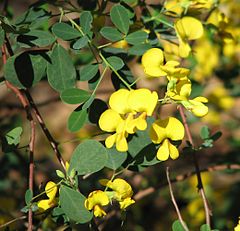Goodia
| Goodia subsp. var. | ||||||||||||||||||||||||||||||||||||||||||||||||||||||||
|---|---|---|---|---|---|---|---|---|---|---|---|---|---|---|---|---|---|---|---|---|---|---|---|---|---|---|---|---|---|---|---|---|---|---|---|---|---|---|---|---|---|---|---|---|---|---|---|---|---|---|---|---|---|---|---|---|

|
|
| ||||||||||||||||||||||||||||||||||||||||||||||||||||||
| ||||||||||||||||||||||||||||||||||||||||||||||||||||||||
Goodia is a genus in the pea family, Fabaceae.
| Standard Cyclopedia of Horticulture |
|---|
|
Goodia (after Peter Good, who found the plant in New South Wales). Leguminosae. Australian shrubs, with pea-like flowers. There are 2 goodias; both species have long been cult, in a few conservatories abroad, but the pubescent species is now forgotten and the glabrous one, in Amer. is cult, chiefly in S. Calif, outdoors. Under glass these shrubs are treated like Cape heaths or Australian hard- wooded plants. It has no near allies of garden value. It belongs with 4 other Australian genera to sub- tribe Bossiaea, in which the lvs. are mostly simple: stamens coalesced into a sheath, which is split above: seeds strophiolate. From these 4 genera Goodia differs in having 3 pinnate lfts. and its racemes terminal or opposite the lvs. instead of axillary. A. Schultheis writes that goodias are occasionally seen in florists' windows in America. Wm. Watson, of Kew, says the flowers are very fragrant, and remain on the plant a long time. He adds (G.F. 2:244): "Probably this plant, if taken in hand by the florists, would prove quite as useful for spring flowering as the popular Cytisus racemosus." CH
|
Cultivation
- Do you have cultivation info on this plant? Edit this section!
Propagation
- Do you have propagation info on this plant? Edit this section!
Pests and diseases
- Do you have pest and disease info on this plant? Edit this section!
Species
The genus consists of two species, both native to Australia:
- Goodia lotifolia Salisb. - Golden Tip
- Goodia medicaginea F.Muell. - Western Golden-tip
Gallery
If you have a photo of this plant, please upload it! Plus, there may be other photos available for you to add.
References
- Standard Cyclopedia of Horticulture, by L. H. Bailey, MacMillan Co., 1963
- PlantNET New South Wales Flora Online: Goodia
- FloraBase – The Western Australian Flora: Goodia
